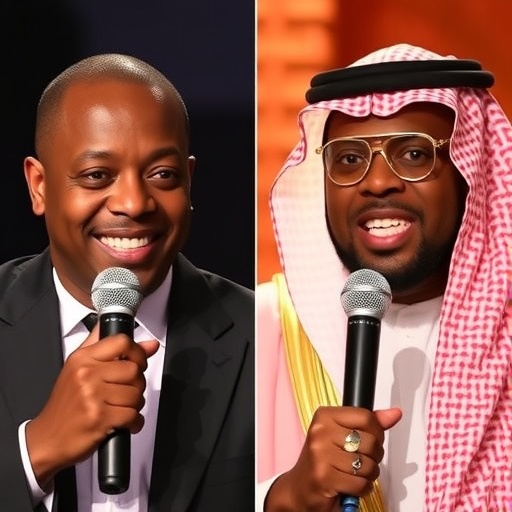Riyadh Comedy Festival Ignites Fury: Dave Chappelle and Kevin Hart Slammed for Saudi Arabia Appearance Amid Human Rights Backlash
In a bold move that’s dividing the entertainment world, the inaugural Riyadh Comedy Festival has rolled out the red carpet for over 50 top-tier comedians, including heavyweights like Dave Chappelle and Kevin Hart. But as laughter echoes through the Saudi capital, a storm of controversy brews over Saudi Arabia‘s troubling human rights record, with critics accusing the event of being little more than a glossy cover-up for systemic abuses.
- Star-Packed Roster Spotlights Riyadh’s Ambitious Entertainment Gamble
- Human Rights Activists Decry Festival as Whitewashing Tool
- Fan Backlash and Comedian Responses Fuel Online Firestorm
- Saudi Vision 2030’s Cultural Pivot Faces Global Skepticism
- Future Ramifications: Will Comedy Bend or Break in Riyadh?
The festival, set to kick off in late 2024, promises a weekend of unfiltered humor in one of the world’s most restrictive regimes. Yet, the star-studded lineup has sparked immediate outrage from activists, fans, and fellow entertainers who argue that performing in Riyadh equates to endorsing a government notorious for executions, women’s rights crackdowns, and the suppression of free speech. Social media is ablaze with hashtags like #BoycottRiyadhComedy and #ComedyForRights, as petitions circulate urging Chappelle and Hart to pull out.
This isn’t just another comedy showcase; it’s a flashpoint in the ongoing debate over Saudi Arabia‘s aggressive push into global entertainment. With billions poured into cultural diversification under Crown Prince Mohammed bin Salman’s Vision 2030, events like this are designed to rebrand the kingdom from oil-rich autocracy to vibrant cultural hub. But for many, the Riyadh Comedy Festival represents the latest chapter in ‘sportswashing’—using high-profile spectacles to whitewash human rights violations.
Star-Packed Roster Spotlights Riyadh’s Ambitious Entertainment Gamble
The Riyadh Comedy Festival boasts an enviable array of talent that could rival any major U.S. or European event. Headliners Dave Chappelle, known for his razor-sharp social commentary on Netflix specials, and Kevin Hart, the box-office king with films grossing over $4 billion worldwide, anchor the bill. Joining them are comedy luminaries like Amy Schumer, Ronny Chieng from The Daily Show, and rising stars such as Sam Jay and Hasan Minhaj, whose Netflix series Patriot Act often tackled global politics.
Organizers from the Saudi General Entertainment Authority (GEA) have hyped the event as a ‘celebration of universal laughter,’ promising sold-out arenas at the Kingdom Arena in Riyadh. Over 50 acts are confirmed, spanning stand-up, improv, and sketch comedy, with performances in English and Arabic to appeal to both local and international audiences. Ticket prices range from $50 for general admission to $500 for VIP packages, including meet-and-greets—a pricing strategy aimed at attracting affluent tourists and expats.
Behind the glamour, the festival is a cornerstone of Saudi Arabia‘s Vision 2030 reforms, which allocate $13.3 billion annually to entertainment sectors. Since 2016, the kingdom has hosted mega-events like the Formula 1 Saudi Arabian Grand Prix and concerts by Justin Bieber and BTS, drawing millions and boosting tourism revenue by 25% in 2023, according to official stats. The GEA claims the Riyadh Comedy Festival will create 1,000 jobs and inject $100 million into the local economy, underscoring Riyadh’s transformation from a conservative backwater to a nightlife hotspot.
Yet, whispers of censorship linger. Comedians have been advised to steer clear of sensitive topics like politics, religion, or the Yemen war—topics that have landed Saudi citizens in prison under the kingdom’s cybercrime laws. One insider, speaking anonymously to Reuters, revealed that scripts are being pre-reviewed, raising eyebrows about how ‘edgy’ the humor will truly be. For Chappelle, whose specials often push boundaries on race and identity, this could mean toning down his signature provocations.
The lineup’s diversity is notable: 40% of performers are women, including trailblazers like Nikki Glaser and Jessica Kirson, aligning with Saudi Arabia‘s recent lifts on female driving bans and cinema openings. But critics question if this is genuine progress or performative optics, especially as women’s rights activists like Loujain al-Hathloul remain imprisoned for advocating equality.
Human Rights Activists Decry Festival as Whitewashing Tool
The controversy surrounding the Riyadh Comedy Festival isn’t confined to social media; it’s rooted in Saudi Arabia‘s well-documented human rights abuses. Amnesty International has condemned the event as ‘artwashing,’ a term coined to describe how authoritarian regimes use culture to deflect scrutiny. In 2023 alone, Saudi Arabia executed 172 people, the highest rate in decades, per Human Rights Watch (HRW). Many were for non-violent offenses like drug possession or apostasy, fueling accusations of arbitrary justice.
Women’s rights remain a flashpoint. Despite reforms, guardianship laws still require male permission for women to travel or marry, and LGBTQ+ individuals face imprisonment or worse under Sharia-based penalties. The 2018 murder of journalist Jamal Khashoggi in Istanbul’s Saudi consulate, widely attributed to the crown prince by U.S. intelligence, continues to haunt the kingdom’s international image. HRW’s Sarah Leah Whitson stated in a recent op-ed, “By hosting Chappelle and Hart, Saudi Arabia isn’t buying laughs—it’s buying legitimacy at the expense of silenced voices.”
Petitions on Change.org have garnered over 50,000 signatures, calling on comedians to boycott. One viral letter from the group Saudi Dissidents Abroad reads: “Your jokes may land punches, but performing there punches down on the oppressed.” Social media reactions are fierce; a Twitter thread by activist Yahya Assiri amassed 200,000 views, juxtaposing festival promo clips with footage of public floggings.
Comparisons to past scandals abound. In 2019, rapper Nicki Minaj pulled out of a Jeddah concert after learning of a detained activist’s plight. Similarly, Conor McGregor’s 2023 Riyadh boxing bout drew ire for ignoring migrant worker exploitation, where thousands labor under the kafala system with passport confiscations and unpaid wages. The Riyadh Comedy Festival, say experts, fits this pattern of ‘soft power’ diplomacy, much like Qatar’s World Cup or the UAE’s F1 races.
United Nations Special Rapporteur on human rights in Saudi Arabia, Javaid Rehman, warned in a 2024 report that such events “normalize repression while the world watches entertainers profit.” Rehman highlighted how cultural imports often come with strings attached, including surveillance of attendees and performers via apps like Absher, which tracks women’s movements.
Fan Backlash and Comedian Responses Fuel Online Firestorm
As news of the Riyadh Comedy Festival spreads, the comedians at its center are feeling the heat. Dave Chappelle, no stranger to controversy after his transgender jokes drew protests, has yet to comment directly. However, in a 2023 podcast, he defended performing in ‘challenging places,’ saying, “Comedy thrives on discomfort—why not bring it where it’s needed most?” Fans are divided; some praise his boldness, while others, like comedian Hannah Gadsby, tweeted, “Chappelle’s edge dulls when he ignores the real cuts in Riyadh.”
Kevin Hart, ever the crowd-pleaser, issued a statement via his publicist: “I’m excited to spread joy globally. Laughter unites us all.” But this hasn’t quelled the uproar. A Change.org petition targeting Hart has 30,000 signatures, citing his past advocacy for social justice in films like Jumanji. Hashtags like #HartHypocrite trend alongside memes mocking his ‘irresponsible’ tour stops.
Other performers are more vocal. Amy Schumer, who faced backlash for her 2018 Saudi visit, told Variety, “I get the economic incentives, but we can’t pretend the money isn’t blood-stained.” Ronny Chieng, known for skewering dictators on TV, joked in an Instagram Live, “I’ll do Riyadh if they let me roast the royals—spoiler: they won’t.” Meanwhile, lesser-known acts like Jordan Jensen have withdrawn, citing ethical concerns in a joint statement with 10 other comics.
Public sentiment on platforms like Reddit and TikTok reveals a generational rift. Younger audiences, influenced by movements like #MeToo and Black Lives Matter, are more likely to boycott, with a 2024 YouGov poll showing 62% of U.S. millennials view cultural events in repressive regimes as unethical. Older fans, however, see it as harmless fun; one Facebook group, ‘Support Comedy Everywhere,’ has 15,000 members defending the comedians.
The online firestorm has real-world ripples. Ticket sales for the festival are reportedly 70% of capacity, per unofficial leaks, as boycotts bite. Influencers like podcaster Joe Rogan, a Chappelle ally, weighed in on his show: “It’s a tough call—free speech versus complicity. But canceling artists helps no one.” This debate underscores the controversy‘s depth, turning the Riyadh Comedy Festival into a litmus test for celebrity ethics.
Saudi Vision 2030’s Cultural Pivot Faces Global Skepticism
Saudi Arabia‘s foray into comedy is part of a broader strategy to diversify its economy beyond oil, which accounts for 40% of GDP. Vision 2030, launched in 2016, targets $100 billion in entertainment investments by decade’s end, including theme parks, e-sports arenas, and film studios. The GEA, under CEO Turki Alalshikh—a close bin Salman advisor—has orchestrated hits like the 2023 Riyadh Season, which attracted 20 million visitors and generated $2.5 billion.
Proponents argue this cultural opening fosters tolerance. Since 2017, cinemas have screened over 500 films, and comedy clubs like Riyadh’s ‘Laugh Factory’ host local talents poking fun at everyday life. A 2024 Arab Barometer survey found 55% of Saudis under 30 support these changes, viewing them as steps toward modernization. The kingdom points to reforms like ending the ban on women driving and allowing concerts as evidence of progress, with female workforce participation rising from 18% in 2016 to 35% today.
Yet, global skepticism persists. The human rights watchdog Freedom House rates Saudi Arabia as ‘not free,’ scoring it 7/100 for civil liberties. Critics like the Carnegie Endowment’s Abdullah Alandari argue that entertainment is a facade: “While Chappelle jokes about Netflix, Saudi Netflix users can’t access content critical of the regime.” Censorship is rampant; in 2023, 1,200 Twitter accounts were suspended for ‘spreading rumors,’ per the interior ministry.
Economically, the gamble pays off. Tourism surged 156% in 2023, per the World Travel & Tourism Council, with events like the Riyadh Comedy Festival luring high-spenders. But boycotts could dent this momentum. A 2024 Deloitte report warns that reputational risks from human rights ties could cost the entertainment sector $500 million annually if Western stars stay away.
Comparatively, China’s entertainment market thrives despite Uyghur concerns, hosting stars like Lady Gaga (pre-2016 ban). Saudi Arabia aims for similar insulation, but the controversy highlights vulnerabilities in a hyper-connected world where one viral tweet can sway public opinion.
Future Ramifications: Will Comedy Bend or Break in Riyadh?
As the Riyadh Comedy Festival approaches, its fallout could reshape the comedy landscape. For comedians like Chappelle and Hart, the backlash risks alienating progressive fans, potentially impacting future bookings and endorsements. Hart’s Netflix deal, worth $100 million, faces scrutiny, while Chappelle’s Netflix specials might see diminished viewership if protests escalate.
If the event proceeds smoothly, it could embolden more high-profile acts, accelerating Saudi Arabia‘s soft power. Organizers eye annual iterations, with talks of a 2025 expansion to include improv festivals and comedy workshops for Saudi youth. This might nurture local talent, as seen with emerging Saudi comics like Fahad Albutairi, whose YouTube sketches have millions of views.
However, a boycott wave could force introspection. Activists push for ‘ethical touring’ guidelines, similar to MusiCares’ standards for musicians. The International Comedy Association is considering a statement on performing in repressive states, potentially influencing agents and promoters.
Broader implications loom for global entertainment. As nations like Saudi Arabia invest in culture, the industry grapples with complicity. Will stars prioritize paychecks over principles, or demand reforms like prisoner releases as performance conditions? The controversy might inspire hybrid models—virtual tie-ins or charity donations tied to events.
Ultimately, the Riyadh Comedy Festival tests laughter’s limits in the face of oppression. If human rights concerns prevail, it could mark a turning point, urging comedians to wield their platforms not just for jokes, but for justice. As one activist quipped, “In Riyadh, the real punchline might be on the performers—if they dare to speak truth to power.”








